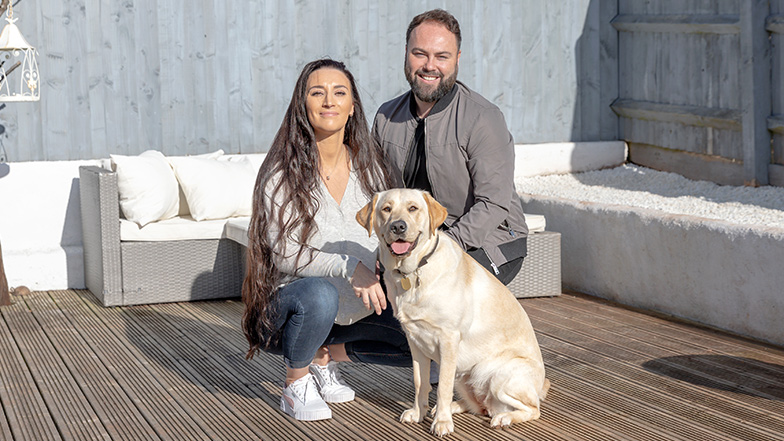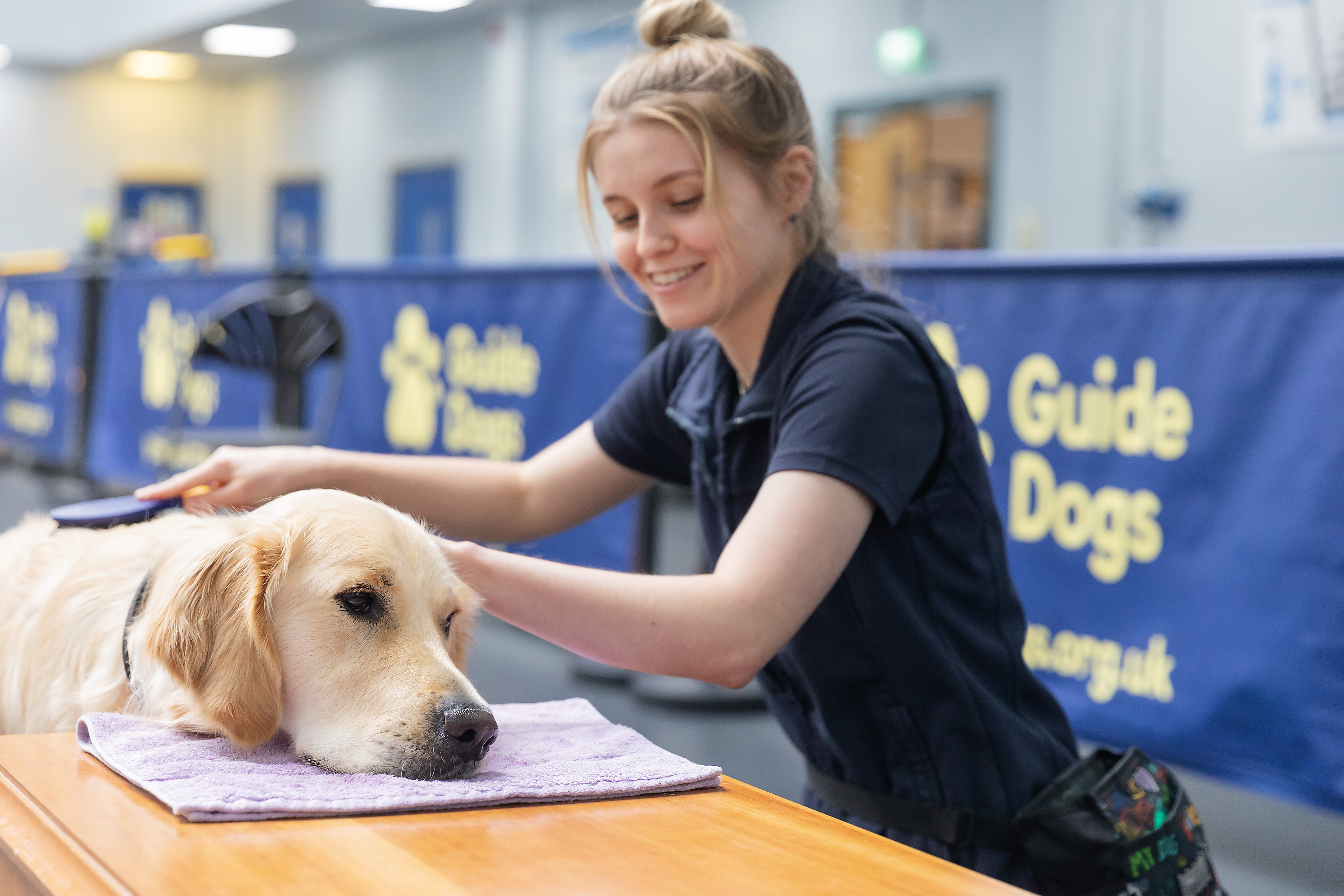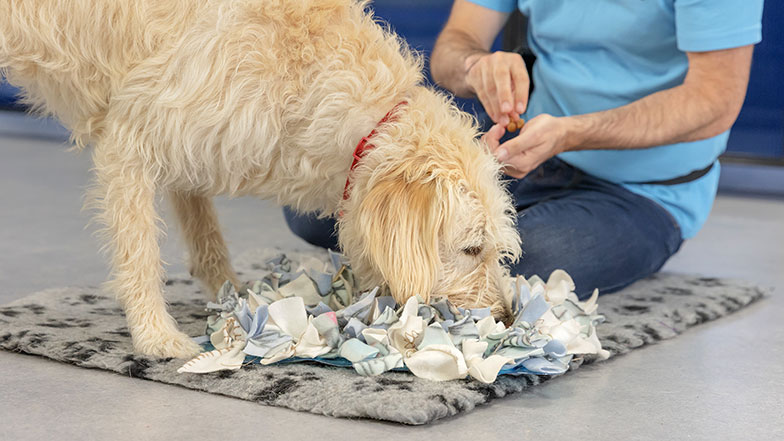Settling a new puppy or dog into your home
Bringing home a new dog or puppy is very exciting, and we’re here to help you understand what to expect when they first arrive. Preparing for the first few days, along with learning about topics such as socialisation, training, and vaccinations, can help to set you both up for success, and get your relationship off to a great start.
On this page
The journey home
If you’re collecting your new dog in the car, making sure they’re safe and secure is the top priority. How your dog travels in your car will depend on their age, size, whether they’re toilet trained and if they’ve travelled in a car previously. Some different options to consider include:
- In a crate on the back seat, as long as the crate is secured.
- On the back seat secured by a car harness and seat belt.
- In the boot in a secured crate that’s closed but unlocked.
For puppies and young dogs, you might want to place puppy pads in their crate. If it’s a long journey, take plenty of breaks to give your new dog or puppy the chance to go to the toilet outside and stretch their legs. This is a good opportunity to offer your dog a drink too.
Before allowing your dog out of the vehicle, make sure you’ve attached their lead. Choose a quiet area, such as the back of a car park, away from other dogs or people, to avoid overwhelming your dog. This is particularly important for young puppies, who may not be fully vaccinated. If you’ve not yet introduced your puppy to a collar or lead, you may need to carry them.
The first few days and nights
Managing your dog’s emotional and physical needs is important, as starting life in a new home can be overwhelming for them. Monitoring your dog’s body language will help you to understand how they’re feeling, and this is at the heart of the Guide Dogs principle getting to know your dog.
In terms of physical needs, two of the biggest challenges new dog owners may face are toilet training and sleep routines. How you approach these areas will differ depending on the age and background of your dog.
Toilet training
If you have a new puppy, you’ll need to offer them the chance to go to the toilet as often as every 20-30 minutes – remember that they don’t know how to ask to toilet yet, and their bladders are tiny! It’s key for your puppy to feel relaxed when toileting outside, so once they’re settled you can encourage them to go on a variety of surfaces too.
It's likely that your new puppy will have an accident – they’re still learning and don’t yet understand our rules, like toileting outside. Also, a new environment can be overwhelming for them. For these reasons, you may wish to put down puppy pads. If you have a lot of carpet in your home, you can purchase carpet protector and carpet cleaner from most pet stores or supermarkets. In addition, you can limit your puppy’s access to carpeted rooms by using baby gates while they’re still being toilet trained.
If your new dog is older, it’s important to show where you’d like them to go to the toilet. For example, encourage them to explore your garden and praise them when they toilet there. During the first few days, it’s also key to monitor for signs your dog needs to go, such as sitting by a door, and respond quickly to avoid any accidents.
Sleep routines
Understandably, your new dog or puppy might feel a bit worried during the settling in period. It's very normal for a new dog to cry or whine during the first couple of nights.
To help them settle, avoid active games or exercise close to bedtime, and introduce calming activities, such as chew toys, and give them the opportunity to toilet. To help them to understand when it’s their bedtime, you should create a routine and stick to it, so they know what to expect. For example, you could say a particular word to indicate that it’s time for their last toilet opportunity of the day, like “bedtime”, and then turn the lights off.
If they’re struggling to sleep alone at night in the first few days in your home, and this is what you’d like them to do long term, try sleeping near them for a few nights and gradually moving further away from them over the following nights.
Training and socialising your new puppy or dog
Training and socialising your new dog are effective and fun ways to bond with them. Additionally, training will help to keep them safe, and good socialisation is important for their emotional wellbeing.
Start training
We recommend that you start teaching your dog after they’ve shown signs of feeling settled in their new home. You could start with some basic cues, such as ‘drop’, and practise their recall.
There are many puppy training classes available, so find one that’s local to you. It’s important to carefully research puppy classes to find one that provides reward-based training, has accredited trainers, and ensures a safe and calm learning environment.
Generally, there are fewer training classes on offer for older dogs. Expect to be in a small group or even on a 1:1 basis. This can be useful if there’s a particular behaviour you’d like to address because the trainer can give you more tailored advice. Some dogs, particularly rehomed dogs or rescue dogs, may have more significant behavioural challenges. Consider seeking support from a qualified behaviourist – your vet may be able to recommend one to you.
Socialising your new dog or puppy
Socialisation is the process through which dogs learn about the world. It includes things like meeting new people or dogs and experiencing new sights, smells, and textures. Puppy classes can be a good way to do this as well as meeting a friend for a walk in the park or taking your dog to a dog-friendly café.
Socialising a puppy versus socialising an older dog can often require different approaches.
Partnering with your dog or puppy
A new dog is part of your family, and you should enjoy a bond that’s rooted in love and respect for one another. We call this “partnering with your dog” and it’s one of our four Guide Dogs principles. Partnering with your new dog or puppy is about advocating for your dog, understanding their individual behaviour, and learning that human needs and dog needs differ. We need to gently teach our dogs to fit in with our lifestyle, and other times we need to adapt to meet theirs. We can think about our relationship with them as a ‘trust account’ - building up trust like a bank account by adding a little each day, via positive experiences, which strengthens your overall relationship with your dog.
Veterinary care
No matter whether your new dog is a puppy or an older dog, you’ll need to register with your local vet. If you have a puppy, you’ll need to book them in for their first course of vaccinations – they’ll have their first vaccinations at around eight weeks old, and their second approximately 28 days later. Some types of vaccination may require a third, at around 12 weeks old. Dogs and puppies may also need kennel cough vaccinations. An older dog will still need booster vaccinations on an annual basis.
How often your dog should have worm and flea treatment depends on their age – puppies will need treatment more often than an older dog. Also, the best type of treatment will depend on where you live and your dog’s lifestyle, so it’s always best to ask your vet’s advice.
It’s a legal requirement to ensure your new dog or puppy is microchipped, as this helps to prevent dog theft, and to make sure your dog is returned to you if they’re lost. If your new dog is older and already has a microchip, make sure you update the details with your information.
Getting pet insurance for your new puppy or dog is vital, and part of your responsibility as a dog owner, as your dog will likely need veterinary care at some point in their life.
Taking your dog or puppy for their first walk with you
Even before your puppy sets their paws on a pavement, you can take them on outdoor adventures in the car. This is a way to let them see the world while ensuring they won’t accidentally meet another dog before they’ve had the right vaccinations or feel confident enough to do so.
A week after your puppy has had their second round of vaccinations, you can take them out for their first outdoor experience. There’ll be lots of new sights and smells and your puppy will want to explore. It’s a good idea to build up the length of your outdoor adventures. Just five to ten minutes, a couple of times a day is enough for young puppies.
An older dog might need a bit of time to settle into their new home – a new environment can be stimulating enough without a walk. Keep them on a lead while they get used to their new surroundings, and only allow them to exercise off the lead if they have strong and reliable recall.
Who to contact for more help and advice
By following our tips and advice, you can help ensure you and your new dog or puppy have the best start to your life together. If you have any questions or concerns, you can contact your vet, a qualified trainer, or a behaviourist.
If you're a guide dog owner and have any general queries about your guide dog partnership, please feel free to contact Guide Line at 0800 781 1444.
If your new dog or puppy hasn’t arrived yet, check out our advice on how to prepare for your new dog or puppy.
You might also like...
Reviewed by: Tim Stafford, Director of Canine Affairs on 27 August 2024
Guide Dogs is committed to the highest standards of dog welfare, operating on the knowledge that the welfare of our dogs is inseparable from the wellbeing of our service users. Our staff, volunteers, and service users, undergo comprehensive training in dog care and welfare, to ensure close adherence to our key welfare principles.
We create educational and informative content to share our 90-plus years’ worth of canine expertise. This content is periodically reviewed as we continue to embrace new knowledge and scientific insights to improve how we breed, raise, train, and partner our dogs.
Whilst Guide Dogs may be able to suggest various third-party websites and third-party products when pertaining to dog care, those are not endorsed by Guide Dogs. Guide Dogs has no control over those third parties and cannot be held responsible for the accuracy of information and support they can provide or the suitability and quality of any products or services they provide.
Related content
- Enrichment ideas for dogs
- Puppy socialisation
- How to keep your dog safe in cold weather
- Dog health checks at home
- Common dog dangers outside
- Seasonal dangers for dogs
- How to meet your dog's welfare needs
- Dog first aid
- Common household dangers for dogs
- Introducing you new dog to your pets
- Preparing for your new dog or puppy to arrive
- What to expect after the arrival of your new dog or puppy
- Reading and understanding your dog's body language
- Dogs at Christmas
- Caring for older dogs
- Dogs and hot weather
- Routine health checks at the vet
- Arthritis in dogs
- How veterinary practices can support guide dog owners
- Dogs and fireworks
- Dogs and babies
- Dogs and Easter
- How to groom your dog






